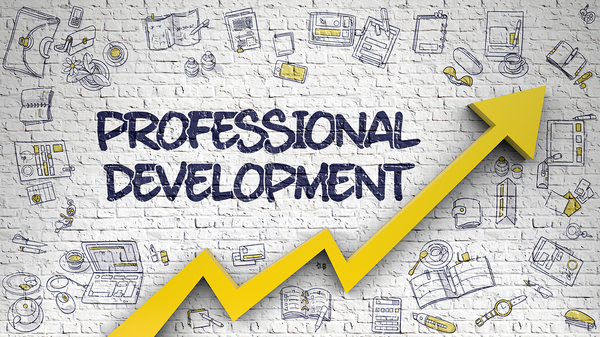Top Professional Development for Career Growth
In today’s fast-paced world, professional development is more important than ever. With technology evolving rapidly and industries changing, the ability to grow your skills and adapt is key to staying competitive in the workforce. Whether you’re just starting out or looking to advance in your career, investing in professional development can help you gain new knowledge, improve your abilities, and boost your career prospects.

What is Professional Development?
Professional development refers to the skills, knowledge, and experiences that help individuals grow in their careers. It includes activities like attending workshops, completing courses, seeking certifications, and gaining hands-on experience. Essentially, it’s any effort that improves your ability to perform in your job and prepares you for future roles.
Professional development is essential for career advancement, as it allows you to stay updated with industry trends, improve your expertise, and increase your employability.
Learn more about the importance of professional development
Why Professional Development Matters
There are several compelling reasons to invest in professional development, especially in today’s rapidly changing job market.
1. Stay Current in Your Industry
Industries evolve constantly, especially with advancements in technology. Professional development ensures that your skills stay relevant and up to date. This continuous learning helps you stay competitive and knowledgeable, preventing you from falling behind as the job market changes.
For example, in fields like data science or digital marketing, staying updated with new tools, trends, and techniques can make a huge difference in your career trajectory.
2. Enhance Your Skills
Whether you’re looking to master technical skills, develop leadership qualities, or improve your communication, professional development helps you fine-tune these abilities. The more versatile you are, the more valuable you become to your employer or clients.
You can focus on skills that are directly relevant to your current role or branch out to prepare for future positions. Platforms like LinkedIn Learning or Coursera offer countless opportunities to sharpen your skill set.
3. Increase Career Opportunities
Professionals who actively invest in their development tend to have more job opportunities, higher salaries, and better career advancement prospects. Continuous learning signals to employers that you are committed to your personal and professional growth.
By gaining new qualifications or expanding your expertise, you become more appealing to potential employers or clients, which can open up new career doors.

Top Professional Development Skills to Focus On
To stay ahead of the curve, certain skills can greatly benefit your professional growth. Here are some of the top areas of focus for today’s professionals:
1. Leadership and Management Skills
Effective leadership is crucial for advancing in any career. Developing leadership and management skills is essential, especially if you’re aiming for managerial positions or roles that require team coordination. These skills enable you to motivate others, make strategic decisions, and manage projects efficiently.
Investing in leadership courses or reading leadership books can help you develop these critical skills.
2. Technical Proficiency
No matter your profession, having a strong understanding of relevant technologies is crucial. In today’s world, even roles that traditionally didn’t involve technology require some form of tech-savviness.
For example, professionals in fields like marketing should be familiar with tools like Google Analytics, SEO, and email marketing software, while those in finance may benefit from learning data analysis tools like Excel or R.
3. Communication Skills
Being able to communicate effectively is key to success in any industry. This includes verbal communication, written communication, and listening skills. Strong communication fosters better teamwork, clearer client interactions, and greater collaboration across departments.
Improving your communication skills can increase your ability to manage teams, negotiate deals, or even deliver successful presentations.
4. Problem-Solving and Critical Thinking
The ability to think critically and solve problems is a vital skill in today’s workplace. Whether you’re addressing customer issues, improving processes, or designing innovative solutions, strong problem-solving skills help you navigate challenges efficiently.
Courses in critical thinking, design thinking, or even project management can help you enhance your problem-solving abilities.
Explore critical thinking courses for professional growth
5. Time Management
Managing your time efficiently can make a significant impact on your productivity. Professionals who know how to prioritize tasks, set deadlines, and avoid distractions are far more likely to meet their goals and advance in their careers.
Investing in time management courses or using tools like Trello, Asana, or Microsoft Planner can greatly improve your work efficiency.
6. Emotional Intelligence (EQ)
Emotional intelligence is a key factor in building relationships, managing stress, and working with others in a collaborative setting. EQ helps you understand your emotions and the emotions of others, which can improve communication, conflict resolution, and leadership.
Developing your emotional intelligence can set you apart in the workplace and help you navigate challenging situations with greater ease.
Where to Find Professional Development Opportunities
There are many ways to pursue professional development. Here are some of the most popular resources:
1. Online Learning Platforms
Online learning platforms offer a wide variety of courses in different fields. Some of the best platforms for professional development include:
-
LinkedIn Learning: Offers courses on leadership, communication, and technical skills.
-
Coursera: Provides certifications from top universities and companies, perfect for career advancement.
-
Udemy: Features practical, hands-on courses across various industries and skill levels.
These platforms allow you to learn at your own pace, with the flexibility to fit courses into your schedule.
2. Workshops and Conferences
Attending workshops and conferences allows you to learn from industry experts, network with peers, and gain new insights into your field. Many conferences also offer certifications or credentials upon completion.
Check out relevant conferences in your industry or sign up for workshops to meet like-minded professionals and gain new knowledge.
3. Mentorship and Networking
Mentorship provides personalized guidance, helping you grow and develop within your career. Whether it’s a formal mentor-mentee relationship or informal networking with peers, engaging with experienced professionals can offer valuable insights and advice.
Participating in professional networks and industry groups can open doors for mentorship opportunities and collaborative projects.
FAQs About Professional Development
1. How can professional development help with career advancement?
Professional development equips you with the skills and knowledge needed to excel in your current role and prepares you for future roles. By continuously improving your abilities, you increase your chances of earning promotions and new opportunities.
2. Is professional development only for people in leadership roles?
No, professional development is beneficial for individuals at any level. Whether you’re a junior employee or a seasoned executive, developing your skills can help you stand out and advance in your career.
3. How often should I engage in professional development?
Professional development should be an ongoing process. Regularly attending workshops, taking courses, or reading industry-relevant materials ensures you remain competitive and informed in your field.
4. Can I achieve professional development on my own?
Yes, many professionals engage in self-guided development through online courses, reading, or practicing new skills. However, combining self-learning with mentoring or networking can help you gain more diverse insights.
Conclusion
Professional development is not just about gaining new skills; it’s about committing to your ongoing growth and improvement. Whether you focus on leadership, technical skills, or emotional intelligence, the investment in your development will pay off in both your personal and professional life.
By utilizing the resources available, such as online platforms, workshops, and networking, you can enhance your skills and advance your career. Don’t wait—start your professional development journey today and unlock new opportunities for success!




